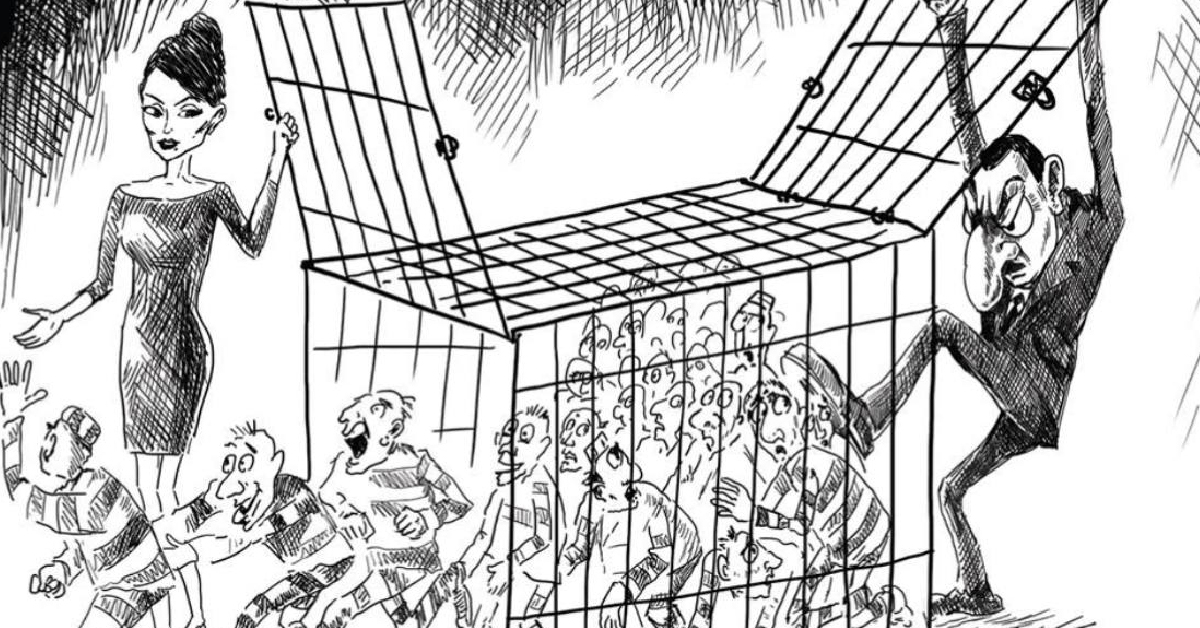“GEGHARD”
SCIENTIFIC ANALYTICAL
FOUNDATION
2026
2026
2025-04-02

The caricature by Sh. Jafarova
In 2024, religious freedom conditions in Azerbaijan remained poor, this is how the U.S. Commission on International Religious Freedom (USCIRF) began the section on Azerbaijan in its annual report on countries recommended for the US State Department’s Special Watch List.
The report states that Shia believers in Azerbaijan are persecuted by the authorities on charges of having ties with Iran. Currently, 233 believers have been convicted on false charges and are subjected to physical and sexual violence. The regime in Baku sometimes uses accusations of religious extremism to target its opponents, as in the case of Gubad Ibadoghlu.
The report highlights that Armenians held in Azerbaijani captivity also face mistreatment due to their religious affiliation: “Armenian Christian prisoners are often targeted for brutal treatment including beatings, psychological abuse, lack of access to medical care and proper food, and religious persecution like the attempts to erase cross tattoos through burns.”
Addressing the Armenian religious heritage in Nagorno-Karabakh, the commission noted that newly acquired satellite images confirm the destruction of Armenian churches, cemeteries, and other monuments by Azerbaijan.
The commission recommends that the US government impose targeted sanctions, send an independent investigative group to Nagorno-Karabakh and surrounding areas, limit US security assistance to Azerbaijan, and hold Senate hearings on religious freedom issues in Azerbaijan.
Baku responded to the report in its denialist manner, claiming that any criticism of Azerbaijan is “biased and unfounded” and a result of the influence of the Armenian lobby. Azerbaijani responses also shift the focus onto Armenia, arguing that any criticism of Azerbaijan hinders the peace process in the region.
Previously, international human rights organizations, the Council of Europe, the European Parliament, and the UN Committee Against Torture have also addressed Azerbaijan’s unlawful actions and persecutions.
Azerbaijan, which presents itself to the international audience as “multicultural and tolerant,” stands in stark contrast to the reality depicted in reports. The so-called “tolerant and multicultural” Azerbaijan pursues a hostile, xenophobic, and aggressive policy not only against Armenians but also against Armenian heritage. This approach is common within Azerbaijan itself, targeting ethnic groups such as the Talysh and Lezgins, while Shia believers and members of other religious communities face persecution.
For decades, the number of other ethnic groups in Azerbaijan has steadily declined. Through assimilation and pressure, Azerbaijan has long become a mono-ethnic country. Comparing the census data from 2009 and 2019, we can observe a decrease in the populations of Lezgins, Talysh, Russians, Avars, Tatars, Udis, Georgians, and Jews. Considering that during the same period, the number of Azerbaijanis increased (with their share rising from 91.6% to 94.8% in 10 years), it indicates that conditions have been created for ethnic minorities to either assimilate or leave the country.
In Azerbaijan, various religious communities and their leaders are in a hostage-like status. Robert Mobili, the head of Azerbaijan's Udi community, has been forced to become involved in the appropriation of Armenian religious and cultural heritage in Artsakh.
In March 2025, Bishop Hovakim Manukyan, the Primate of the Armenian Apostolic Church’s Diocese of Great Britain and other Christian leaders, called on the UK Prime Minister to take action for the release of Armenian prisoners held in Azerbaijan. Given that representatives of various churches in the UK signed the letter, Azerbaijan also responded with a collective letter to the UK Prime Minister from the “Religious Leaders of Azerbaijan.” The letter, led by Allahshukur Pashazade, head of the Caucasus Muslims Board, was also signed by leaders from the Russian Orthodox Church, the Albanian-Udi Christian community, and various Jewish communities.
Thus, in the case of Azerbaijan, we are dealing with two different realities and images—one fabricated and one real. The mentioned report, along with numerous documented facts, expose Baku’s so-called “tolerant” image, under which Azerbaijan systematically destroys and appropriates the cultural heritage of the region’s indigenous peoples and persecutes believers.